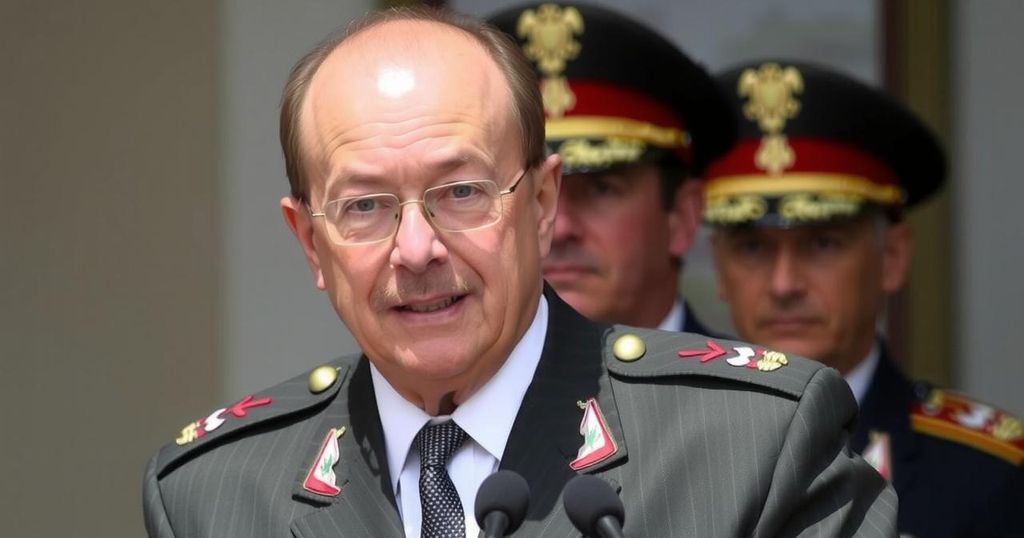Lebanon’s lawmakers have elected Army Chief Joseph Aoun as president, filling a two-year vacancy amid a pressing financial crisis. Aoun aims to foster reforms and oversee a ceasefire with Hezbollah. His presidency is a crucial moment for Lebanon, with support from both local and international actors as the country seeks to recover.
On Thursday, Lebanon’s lawmakers elected Army Chief Joseph Aoun as the new president, addressing a significant two-year void in leadership. This election marks a pivotal moment in Lebanese history as Aoun embarks on the challenging task of guiding the nation out of an unprecedented financial crisis. Upon taking his oath, he expressed optimism, stating, “Today, a new phase in Lebanon’s history begins.” Aoun is now tasked with overseeing a ceasefire in southern Lebanon and establishing a new prime minister to implement reforms demanded by international creditors.
Aoun’s inauguration draws attention to the critical need for stability within a nation plagued by economic turmoil. He has pledged to uphold the state’s authority over arms, particularly in light of recent conflicts between Israel and Hezbollah. In his address, he emphasized the importance of devising a comprehensive defense strategy to confront Israeli actions and to maintain Lebanon’s sovereignty. His presidency reflects both local and international aspirations for a reformed Lebanon, with general support evident from both citizens and foreign powers following his election.
The election of Joseph Aoun, the fifth army commander to assume the presidency in Lebanon, is particularly significant as it coincides with urgent calls for government establishment and reform. Following the end of former President Michel Aoun’s term in October 2022, Lebanon has faced increasing challenges in governance exacerbated by criticism towards Hezbollah’s influence over parliamentary decisions. Following a violent conflict in recent months, there is a renewed expectation for Aoun to facilitate recovery and dialogue among political factions.
International reaction to Aoun’s election has been largely positive, with US and Saudi Arabian officials acknowledging his potential to unify the country and spur necessary reforms. The UN’s representative to Lebanon highlighted the election as a positive development, labeling it a significant first step in alleviating the political vacuum that has hindered Lebanon’s governance. Nevertheless, the road ahead remains fraught with obstacles as Aoun navigates the complexities of a deeply divided political landscape.
Joseph Aoun’s election as Lebanon’s president signifies a transition towards addressing the nation’s pressing challenges. His leadership comes at a time when international relations and domestic reforms are paramount in restoring trust and stability within Lebanon. As the country seeks to regain its footing amidst economic distress, Aoun’s presidency represents an opportunity to foster hope through united efforts toward reform and recovery. However, the path to achieving these goals will require concerted actions and genuine collaboration among Lebanon’s political factions.
Lebanon has faced a prolonged period of political instability, highlighted by a two-year vacancy in the presidential office that culminated with the election of Army Chief Joseph Aoun. The absence of leadership has exacerbated the financial crisis the country is experiencing, widely regarded as its most dire economic situation in history. Aoun’s presidency arrives amid calls for reform from international creditors and the need to stabilize the region following recent conflicts. The power-sharing arrangement in Lebanon, intertwined with its multi-confessional system, mandates a Maronite Christian as president, a position that has seen military leaders rise to power throughout the nation’s tumultuous history. Aoun’s administration is expected to navigate complex domestic and foreign challenges, particularly concerning Hezbollah and relations with Israel.
In conclusion, Joseph Aoun’s recent election as president is a critical juncture for Lebanon, presenting both hope and formidable challenges for the war-torn nation. His commitment to upholding state authority and pursuing necessary reforms reflects a recognition of the urgent need for stability and unity in Lebanon. Aoun’s ability to collaborate effectively with various political factions and international stakeholders will be pivotal in steering Lebanon towards recovery and prosperity as he begins his term in office.
Original Source: www.bryantimes.com






